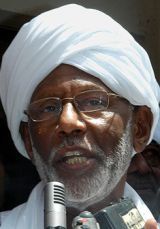Sudanese govt frees prominent Islamist leader Turabi
KHARTOUM, June 30 (AFP) — Sudanese Islamist opposition leader Hassan al-Turabi was freed from jail, 15 months after his arrest over an alleged coup plot, and immediately lashed out at the lack of freedom in his country.

|
|
Sudan’s prominent Islamist opposition leader Hassan al-Turabi speaks to reporters after his release from jail in Khartoum, more than a year after being detained over allegations he was plotting a coup. (AFP) . |
Turabi, the one-time mentor of President Omar al-Beshir, addressed a crowd of supporters in Khartoum after his release, which came as Sudan marked the anniversary of the 1989 military coup that bought Beshir to power.
“Freedoms are still forbidden,” Turabi charged, complaining about press censorship, restrictions on political parties and bans on street demonstrations.
He told hundreds of supporters that his joy would be complete only if all “the people for whom we sacrifice and get arrested were also free.”
As the crowd welcomed its leader at his party’s headquarters in the affluent Khartoum district of Riyadh, people shouted: “Long live Turabi. Turabi, our sole leader.”
Turabi’s wife Wisal al-Mahdi said his opposition Popular Congress (PC) party has received authorization to resume its activities and re-open its Khartoum headquarters.
“All political detainees will be released,” Beshir said in an address commemorating the 16th anniversary of Sudan’s National Salvation Revolution.
He hailed “national unity” after a peace deal between the north and south and efforts to reconcile with the opposition, and said the country’s 16-year-old state of emergency would be lifted soon.
Khartoum and former southern rebels signed a peace deal last January after 21 years of conflict, and a national unity government is due to start operating on July 9. But Sudan’s western Darfur region is still wracked by conflict, and fighting has recently broken out in the east of the country.
Turabi criticized the north-south agreement and the interim constitution, which will come into force on July 9 and which includes power-sharing quotas that give the ruling party and former southern rebels 80 per cent of executive positions and parliamentary seats.
“For the first time in the world, a constitution determines the majority that will rule the country while this should be left to the people to determine,” he said.
“This is unacceptable and we shall demand its amendment,” Turabi added.
He also vowed to fight against what he called “widespread corruption” in the country.
Turabi, 73, was arrested in March 2004 along with Sudanese army officers over government allegations of a coup attempt by sympathizers of Darfur rebels and was awaiting trial on an array of charges.
He was previously under house arrest for the final six months of 2000 and then again from February 2001 until October 2003.
He had been increasingly critical of the government’s scorched-earth policy in Darfur, where some 300,000 people have died and more than two million left homeless as a result of the fighting between Khartoum-backed militiamen and ethnic minority rebels.
Turabi’s lawyer Kamal al-Amin, who also serves as the PC’s legal secretary, said that “no charges were filed against him from the start. He was being held under Sudan’s state of emergency laws.”
“There won’t be a trial.”
An Islamist ideologue with influence beyond Sudan’s borders, Turabi rallied behind Beshir in 1989 but was removed from key posts after losing a power struggle with the president in 1999.
As senior statesman, he became what many considered to be the real power behind the throne of a country he directed towards rigorous Islamic practices, particularly affecting the rights of women.
His moves also earned Sudan a place on the international blacklist, from the United States to Egypt, which accused Khartoum of harboring Islamic “terrorism.”
Turabi also left his mark on Sudan’s foreign policy, which moved toward an Arab and Islamist nationalism which called for liberation from “American-Zionist hegemony.”
